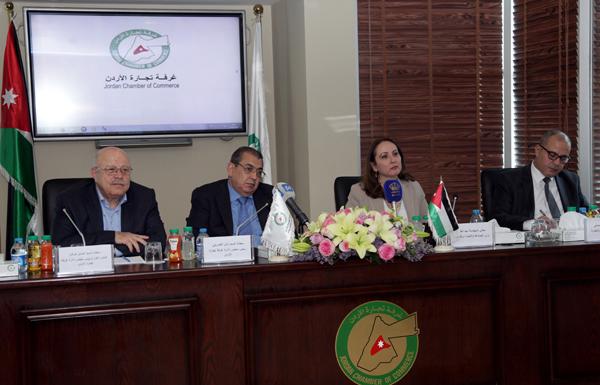You are here
Commerce representatives ask gov't to help counter challenges
By Merza Noghai - Apr 10,2016 - Last updated at Apr 10,2016

Industry, trade and Supply Minister Maha Ali (2nd right) and representatives of the Kingdom’s commercial sector participate on Sunday in a dialogue over challenges facing local businesses (Petra photo)
AMMAN — Representatives of the Kingdom's commercial sector on Sunday asked officials from the Industry, Trade and Supply Ministry to address several issues so as to help develop the market.
The national economy is going through several challenges caused by regional circumstances and border closures with Syria and Iraq, said Jordan Chamber Commerce (JCC) President Nael Kabariti, adding that these factors weakened the purchase power at the internal and external levels.
In this regard, Kabariti highlighted that the economic slowdown is a global issue that many countries suffer from, and the problem is not limited to Jordan, noting that the Kingdom's "distinguished" external relations played an important role in penetrating non-neighbouring countries' markets.
As for registering companies, the JCC president said "Jordan is among the fastest countries in registering companies if they present complete documents to licensing bodies," refuting some allegations that registration transactions take long time.
Also speaking at the meeting, attended by commercial sector representatives, relevant government officials and media, Industry, Trade and Supply Minister Maha Ali expressed keenness to communicate and exchange views with the private sector.
Such gatherings are important to assess accomplishments and listen to demands of the sector, Ali said, adding that the government is aware of current economic circumstances and their negative impacts on the national economy, which call for exerting more efforts to overcome these difficulties.
"The Kingdom's exports in 2015 dropped by 7.1 per cent compared to the year before," the minister indicated, noting that the government offered incentives to the construction, tourism, industrial, ICT and transportation sectors, among others, to motivate the economy.
The government also worked on penetrating alternative markets, especially in Africa, and drew a joint plan with the private sector to increase Jordanian exports to these markets and enhance commercial exchange with African countries.
As for simplifying the rules of origin with the Europeaan Union (EU), Ali expected the issue to go into effect in June, commending the step in improving the investment environment and opening European markets for national products.
She called on the commercial sector to provide enough quantities of foodstuff and maintain prices, due to the approach of Ramadan, and to import items early to avoid piling in Aqaba Port, noting the ministry met with Aqaba Special Economic Zone Authority officials to facilitate import procedures.
Amman Chamber of Commerce President Issa Murad criticised a recent decision to increase tax on the commercial sector from 14 to 20 per cent, describing the decision as negative because it would increase the tax evasion.
Jordan Standards and Metrology Organisation Director General Haydar Zaben said that if importers bring a test report from an internationally-accredited laboratory, they receive entry permission within four hours, noting that the organisation's personnel work round the clock to ensure transactions are completed quickly, due to time differences around the world.
Other members of national chambers of commerce reviewed their demands which included ambiguity in licensing procedures, lowering taxes on fabrics, facilitating clearance measures, unifying inspection institutions.
Ali said the ministry would study the sector's demands with relevant public institutions and work on solving them.
Related Articles
AMMAN — Jordan Chamber of Commerce (JCC) President Nael Kabariti announced on Tuesday that the chamber has inaugurated a liaison office at t
AMMAN — The private sector will call for a halt to all economic transactions with any country or party that approves or supports Israel's de
AMMAN — President of the Jordan Chamber of Commerce (JCC) Nael Kabariti and Syrian Minister of Economy and Foreign Trade Mohammad Samer Al K
















